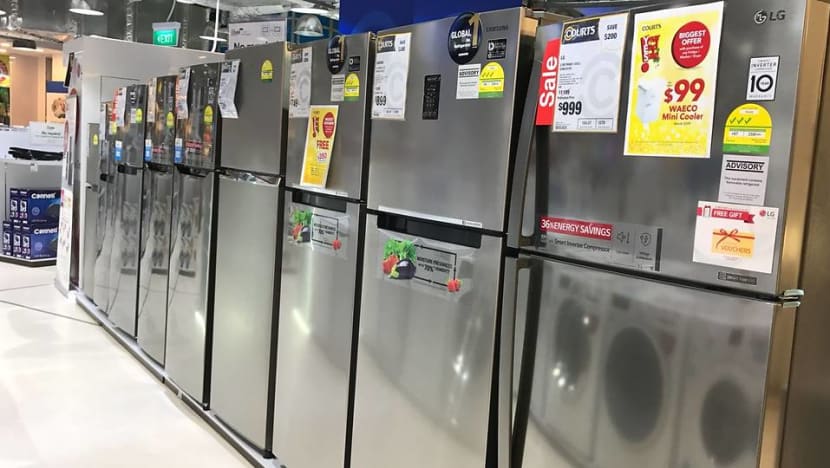NEA to raise minimum energy performance standards for four appliance types

File photo of refrigerators on display at a Courts outlet.
SINGAPORE: The National Environment Agency (NEA) will raise the minimum energy performance standards (MEPS) for four appliance types it regulates starting next year, it said on Tuesday (Jun 8).
The move is part of NEA's ongoing efforts to help households become more energy efficient, contribute to reducing carbon emissions and mitigate climate change, it said in a press release.
From 2022, the new MEPS levels for refrigerators, clothes dryers as well as casement and window air-conditioners will be two ticks, while for split-type air-conditioners, the MEPS will be raised by seven per cent within the two-tick level.
READ: New global carbon exchange to be headquartered in Singapore
The limits for standby power of split-type air-conditioners will also be lowered to reduce passive energy consumption, added NEA.
The enhanced standards come after consultations with the public and industry in late 2020 and also earlier this year, said NEA.
"There were no concerns over the enhanced requirements and inputs received were considered in developing the enhanced requirements," it added.
"SUBSTANTIAL" SAVINGS
With these changes, households will benefit from "substantial" life-cycle cost savings, said NEA.
It noted that collectively, the household sector can reap an estimated S$1.2 million in annual cost savings - the equivalent to the electricity bill of 1,100 four-room HDB flats - as well as reduce greenhouse gas emissions by 2,000 tonnes from using less electricity.
NEA also said that as it implements the enhanced MEPs, it will make sure there is "adequate variety and availability" of models for households to choose from.
"The life-cycle costs of these appliances are expected to be the same or lower after the change. The higher standards will spur suppliers to introduce new and more energy efficient appliances over time," it said.
READ: Commentary: Companies pledging net-zero targets need to show substance
The MEPS along with the Mandatory Energy Labelling Scheme (MELS) are "key" programmes to reduce energy consumption and carbon emissions in the household sector, noted NEA.
"MEPS raises the average energy efficiency of household appliances by removing the least energy efficient appliances from the market. This helps consumers to avoid being burdened by high energy costs from operating energy inefficient appliances," it added.
"Since the introduction of MELS and MEPS, the average energy efficiency of household refrigerators, air-conditioners and clothes dryers have improved by 46 per cent, 42 per cent and 14 per cent respectively."












